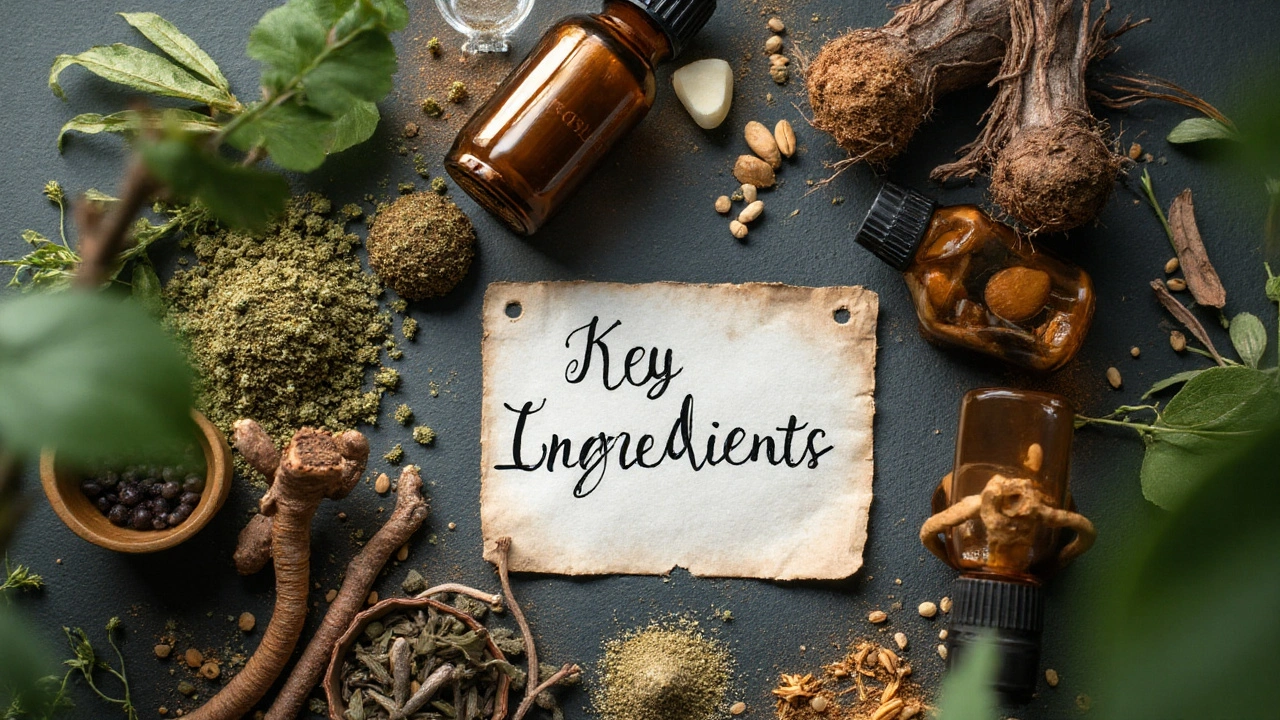It’s tough sifting through a wave of supplements promising the next big thing in wellness. Opium Antidote has been making waves lately, claiming fresh hope for people who want to nurture their body or bounce back from certain dependencies. If you’re tired of marketing noise and want simple facts—what it does, what’s inside, and what you should watch for—here’s the lowdown.
What Is Opium Antidote and Why Are People Talking?
Opium Antidote is a dietary supplement designed to support overall recovery and wellness. People are interested because it’s marketed as an alternative or support tool for people dealing with substance challenges, especially around opioid issues, and those wanting an extra edge in physical well-being. It usually blends plant-based extracts, amino acids, and essential vitamins. In 2025, it’s riding the trend of natural aids to back up traditional treatments—never as a solo solution, but as an add-on.
So, who’s it for? If you feel rundown, need extra help staying on track with recovery, or want a gentle nudge to your daily health, that’s the main crowd. Medical journals, like the latest issue of ‘Addiction Research & Therapy,’ say supplements can play a supporting role but aren’t magic bullets. It’s less about a miracle cure, more about stacking the deck in your favor with daily good habits.
Main Ingredients & How They May Help
Wondering what’s behind the buzz? Here’s a straightforward look at key ingredients commonly found in Opium Antidote formulas and how they’re supposed to help:
- Milk thistle: Said to support liver health, handy for folks dealing with detox or medication strains.
- L-tyrosine: An amino acid that may help mood and mental focus, especially after periods of stress or substance use.
- Vitamin B complex: Involved in restoring natural energy and repairing body systems.
- Rhodiola rosea: An adaptogen known for fighting fatigue and improving resilience in tough times.
- Magnesium: Helps with muscle cramps, anxiety, and sleeplessness.
If you check quality brands, their supplement fact sheets back up ingredient sourcing and purity—something to look for when comparing labels.
| Ingredient | Main Purpose | Typical Dose |
|---|---|---|
| Milk Thistle | Liver Support | 100–300 mg |
| L-Tyrosine | Mood/Energy | 300–500 mg |
| Vitamin B Complex | System Recovery | Full RDA |
| Rhodiola Rosea | Stress Relief | 100–200 mg |
| Magnesium | Muscle, Nerves | 100–200 mg |

How to Use Opium Antidote and Avoid Pitfalls
Popping a pill doesn’t replace expert medical care—especially with anything that claims to help with substance recovery or serious fatigue. If you want to add Opium Antidote to your routine, here’s a safe and smart checklist:
- Talk to your doctor before starting, especially if you take prescription meds or have medical conditions.
- Check that the Opium Antidote supplement follows up-to-date quality standards—look for third-party certification.
- Don’t go above the suggested daily dose hoping for faster results. Too much of anything can backfire—liver stress, belly issues, or nasty interactions.
- Note how you feel day-to-day. If side effects pop up, stop and check with a healthcare provider.
- Pair the supplement with balanced meals, physical activity, and evidence-based support if dealing with dependency.
Supplements aren’t regulated as closely as medicines in most countries, so quality can vary. If a label looks sketchy or promises miracle fixes—hard pass. The real gains come when you combine good lifestyle choices with honest products.
Mini-FAQ: Opium Antidote Supplement
- Is Opium Antidote safe? Generally, ingredients are considered safe when used as directed, but check for allergies or interactions.
- Can it cure addiction? There’s no supplement that cures addiction—this can only support general wellness alongside professional care.
- How fast will I notice changes? Most notice gentle improvements in well-being over a few weeks; there’s no quick fix.
- What should I watch out for? Main risks: overuse, poor-quality formulas, and possible side effects like stomach upset or headaches.

Next Steps: Which Path Is Right For You?
- New to supplements: Start with lower doses, one product at a time, and track your response.
- Managing tough recovery: Bring a list of supplements to your doctor or recovery coach and build a plan together.
- Just want general health support: Look at high-quality, transparent labels and remember—the basics like sleep, eating well, and steady routines still come first.


Mark Rohde
August 22, 2025 AT 11:35If this actually helps people get off opioids it's huge 😮 but don't expect miracles
Rajan Desai
August 23, 2025 AT 08:20This reads like a reasonable primer for someone evaluating an adjunct supplement regimen. The emphasis on third-party certification and ingredient transparency is what separates semi-reputable products from the rest.
Clinicians generally advise checking for standardized extracts, accurate dosing, and contaminant screening reports. For anyone considering this, documenting current medications and sharing the supplement facts with a pharmacist or physician reduces the risk of pharmacologic interactions, particularly with serotonergic agents and CYP-metabolized drugs.
S O'Donnell
August 24, 2025 AT 06:33There is merit in the notion that adjunctive dietary supplements may provide incremental benefits when used judiciously and within a framework of evidence-based care. From a pharmacological standpoint, amino acids such as L-tyrosine are precursors to catecholamines, and it is plausible that, in conditions characterized by depleted neurotransmitter synthesis secondary to chronic stress or substance misuse, supplementation could modestly support mood and cognitive function. However, robust clinical trials that definitively demonstrate clinically meaningful outcomes in populations with opioid dependence remain limited, and the heterogeneity of supplement formulations complicates any direct extrapolation.
Milk thistle, frequently cited for hepatoprotective properties, contains silymarin complexes that have been studied in a variety of hepatic insults; nevertheless, the translational significance for patients undergoing medically supervised detoxification is circumstantial unless accompanied by controlled trials verifying endpoints such as transaminase normalization or reduced hepatic fibrosis progression. Rhodiola rosea has adaptogenic claims supported by small-scale trials showing reductions in subjective fatigue, yet the standardization of rosavin and salidroside content varies widely across products, rendering general statements about efficacy precarious.
Magnesium supplementation, within recommended ranges, may indeed ameliorate neuromuscular irritability and sleep disturbances for some individuals, but the risk-benefit ratio shifts depending on baseline renal function and concurrent medications. The B-vitamin complex is rational in repletion scenarios, particularly for individuals with poor nutritional intake, alcohol use disorder comorbidity, or documented deficiencies.
It is imperative to underscore that supplements are not pharmacotherapies for opioid use disorder and should not supplant medications that have a preponderance of evidence for improved morbidity and mortality. Clinicians should be vigilant for adulterants and for mislabeling, since the regulatory environment for dietary supplements does not mandate the same pre-market proof of safety and efficacy as does pharmaceutical regulation. For these reasons, conservative practice would involve cross-referencing certificates of analysis, selecting formulations from manufacturers with transparent third-party testing, and using supplements as a complement to, rather than a replacement for, established treatment modalities.
Finally, pragmatic monitoring for adverse events, documentation of patient-reported outcomes, and timely communication between patient and provider constitute essential safeguards when integrating such products into a recovery plan. There is room for adjunctive supportive therapies, but the rhetoric must be tempered by clinical prudence and realistic expectations.
Yamunanagar Hulchul
August 25, 2025 AT 07:33This actually gives me hope!!!!
Real talk, small wins stack up. If someone pairs a product like this with therapy, sleep, and friends cheering them on, the whole picture changes. The colorful names make it sound gentle and kind, and sometimes that gentle nudge is exactly what people need to keep going.
Remember to buy from sellers that show tests and to start slow...like tiny steps...not giant leaps!!!
Sangeeta Birdi
August 26, 2025 AT 07:10Noticed the point about tracking day-to-day feelings and I want to say that is so important 😊
Small logs of sleep, mood, and side effects can be shared with a clinician and often reveal patterns that a single visit misses. Staying kind to yourself during recovery is crucial, and supplements that support basic nutrition can be part of compassionate self-care.
Chelsea Caterer
August 27, 2025 AT 04:00Supplements can help in the margins. The main pillars remain consistent: sleep, nutrition, and support. Supplements should never be the centerpiece.
Lauren Carlton
August 28, 2025 AT 00:50The article omits important regulatory specifics. Dietary supplements in many jurisdictions are not subject to pre-market approval for safety and efficacy. This means that while ingredient lists might look benign, contamination with heavy metals, undisclosed pharmaceuticals, or varying active compound concentrations is a documented problem. The recommendation to prioritize third-party certification is sound but underemphasized; independent analysis from labs like USP, NSF, or IFOS provides a measurable quality metric. Additionally, the dosing ranges listed are broad and should be individualized based on renal and hepatic function, concomitant therapies, and documented deficiencies.
Clinicians and consumers must also remain mindful of aggregation risk - multiple supplements with overlapping micronutrients can unintentionally cause supratherapeutic intake of certain vitamins or minerals. For example, cumulative folate and B12 intake from multivitamins plus food plus fortified beverages can mask hematologic signs of deficiency and complicate clinical assessment. The piece's practical advice to start low and one product at a time is medically defensible and should have been stressed earlier.
Katelyn Johnson
August 28, 2025 AT 21:40Really appreciate the safety points - focusing on quality and combining with professional care is the way to go
We can support people best by sharing clear, calm info and pointing them to trusted resources
Elaine Curry
August 29, 2025 AT 17:06I tried something similar years ago when I was half-broken from long shifts and a messy breakup, and a simple mix of better sleep, magnesium, and a B-complex actually helped me feel human again fast. Not a cure but it gave me the energy to make better choices.
Be bold but be careful. Keep receipts and lab reports if you can, and always tell your doc what you take because it matters.
Patrick Fortunato
August 30, 2025 AT 15:20Too much reliance on imported supplements. We should promote local, regulated producers and stricter standards. The global supplement market is a free-for-all and that must change.
Supporting national manufacturing with enforced quality checks will protect consumers better than glossy marketing copy.
Rajan Desai
September 4, 2025 AT 17:33Adding to the previous point on standards: look for companies that publish batch-specific certificates of analysis and make third-party testing easily accessible on their product pages. That transparency reduces the risk of contaminants and dosing variability and provides some reassurance when integrating supplements into broader care plans.
Mark Rohde
September 8, 2025 AT 04:53Yea this. Keep the receipts and the lab slips. Drama but necessary.
Katelyn Johnson
September 21, 2025 AT 11:31Quick reminder to document changes and share them with professionals and loved ones. Small notes add up and make follow-up easier.